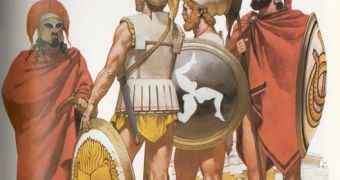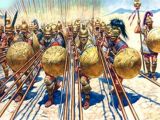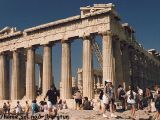1. Ancient Greek culture founded the western culture, with its modern traits of developing intellectual and scientific skills, a culture based on reasoning, investigation and experimentation. Ancient Greeks developed medicine, logics, aesthetics, metaphysics, mathematics and geometry, and this gave them a profound intellectual formation, allowed then to live more, made complex measurements that eased their trade and determined them to live in perfectly organized urban structures. The Greek civilization was made by man, for man and controlled by man. The integral formation of the individual was scientific, intellectual, artistic and sportive.
2. The Greek culture was defined by its art. The three architectural Greek classes: Doric, Ionic and Corinthian, and the anatomic interpretation of the Greek culture will always be actual. The Parthenon of Athens remains the symbol of Greek architecture, while Myron's Discobolus is one of the emblems of Greek culture. The Parthenon was built during Pericles and it is a temple dedicated to the goddess Pallas Athena, being the work of Phidias, who made it in 15 years. In its days, the temple harbored a gold and ivory statue of the goddess, represented with helmet, shield and spear.
3. The mild Mediterranean climate allowed the Greeks to spend most of their activities outside, in houses' porticoes, streets, squares and markets. Greek houses were just a shelter for the night or against rain; houses have few small windows protecting against the heat and light. Most meetings and social life occurred in the main square of a city, called agora.
4. On the highest part of a city, called Acropolis, temples were built. Temples were not just religious buildings, but also the place where politics and justice acts were made. The temple was usually surrounded by a colonnade and it was divided in three parts: naos (portico), cella (sanctuary preserving the image of the god), and opistodoma (treasure room of the god where offerings given by the adorers were stored).
5. Each Greek city (polis) represented an independent small state. The city was sustained by the crops gathered on the surrounding fields, but also by trade with crafted goods. The inhabitants of a city rejected any foreign intervention in their politics, and the power balance was maintained by strong armies, as all men capable of handling a weapon entered the army. The war-like society of the ancient Greeks produced the most powerful ancient infantry soldier: the Greek hoplite. The heavily armored hoplites of Alexander the Great conquered the world known by those times.
Not all the Greek cities were democracies (ruled by citizens); some or ruled by kings, like Sparta, while Macedonia was a real kingdom.
6. Women were given the domestic work, children care and many manual works, like weaving. Greek women wove flax and wool. The fabrics were used for making chiton (a sleeveless tunic, worn by both sexes) and peplos, a body-length garment worn only by women. Women had their dependencies called gynaecea, while men had theirs, called androcea. Greek women could practice sports, had juridical personality for trade operations and could have intellectual activities. Some Greek women excelled in arts and poetry; the most famous was Sappho of Lesbos.
7. The education of the young was a priority for the ancient Greeks, so various philosophers came with their theories of what was best in the formation of the citizens. The education included the study of philosophy, history, literature, science, sport and music (playing zither and flute). The aim was to grow up honest adults, with high artistic sense and good physical condition. The children of rich families were educated by personal pedagogues, teaching them basic knowledge. Later, they were entrusted to specialized masters that detailed them specific matters.
8. The poor soils of Greece forced Greeks to exploit sea's resources and to look for new sources of wealth. This boosted the class of ship builders, sailors and traders. Greeks founded colonies in very remote points of the Mediterranean and Black Seas. The colonies served for the trade with the locals, but, in time, the colonies turned in hotbeds of Greek culture, and those in Sicily or coasts of Asia Minor turned into another Greeces.
9. Important crops in ancient (and modern) Greece were olives and grapes. Olive oil was used both as an aliment and for lighting, but especially as a main trade good. Still, at their origin, the Greeks were shepherds tribes (like all Indo-Europeans) and this is betrayed by the omnipresence of the shepherd, animal husbandry and livestock in all ancient Greek legends, Iliad (the poem of the siege of Troy) and Odyssey included.
10. Greek sportsmen smeared their bodies with oil and grease, using a curbed tool. Greeks enjoyed wrestling and (a type of) boxing. The men had to be totally naked when practicing sports.

 14 DAY TRIAL //
14 DAY TRIAL // 

